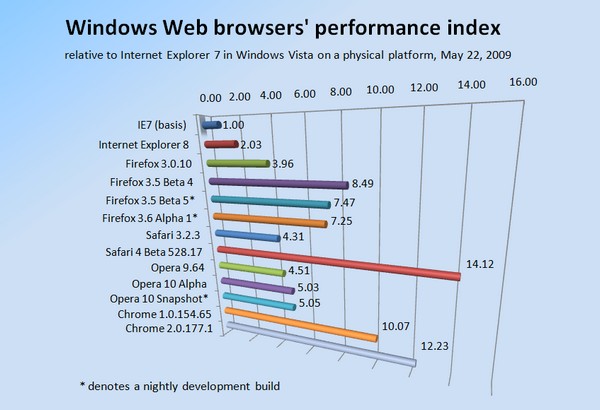By Scott M. Fulton, III, Betanews

Yesterday, Google traded development track 1 of its Chrome Web browser for track 2, making the latter effectively the "stable" edition of the browser, even though it's still officially under development and not yet feature-complete. Many users of version 1 found themselves automatically upgraded to version 2, and may very well have noticed a subsequent speed increase from the JavaScript interpreter.
In a blog post yesterday, Google said that speed increase would be about 30%. But is that an accurate assessment, especially given that Google's V8 JavaScript benchmark was devised by Google to test its V8 JavaScript interpreter?
On Betanews' new physical test platform for Windows-based Web browsers and operating systems, whose construction was completed Friday, our latest tests show that Chrome 2.0.177.1 was 20.4% faster than Chrome 1.0.154.65, in independent benchmarks other than V8 related specifically to speed. Our adjusted performance score for Chrome 2 on our new platform was 21.4% better than Chrome 1, relative to the performance of Microsoft Internet Explorer 7 on the same system.
For the past few months, we'd been testing Web browser performance on easy-to-manage virtual machines. Our move to a physical platform did change our index numbers with respect to Windows Vista, but it changed them fairly proportionately to one another.
Microsoft Internet Explorer 7 ran a little faster in Windows Vista than the IE7 we measured on a virtual system. That should be no surprise to anybody. Naturally, nothing is slower than IE7, which is why we still use it as our index system. But as we verified by repeating the test circumstances from scratch, IE7's speed did jump more than the other browsers in our test.
But not by much. While our initial performance index score for Internet Explorer 8 showed it easily doubling IE7 with room to spare, our reset score was still double that of IE7, with about 215% the speed of its predecessor. IE8's physical index score is 2.03, reflecting a much better SunSpider score for IE7 on the physical platform -- its string processing score is especially higher.
All the other browsers in our test are, as we said, proportionately lower, but with variations less-than-slight enough to justify our having moved our test bed to a physical platform. In our latest tests, Apple's Safari 4 beta registered a score of 14.12 -- meaning Apple's latest browser performs over 14 times better than Microsoft's earlier browser. Divide that score by 2.03, and you'll see how much better performer Safari 4 is than IE8.

Google is following close behind in the race for browser performance, with an index score of 12.23. Let's break that score down a bit: Version 2 scored a 3.28 against IE7 in the HowToCreate.co.uk CSS rendering test, with the JavaScript timer adjusted to compensate for browsers (especially Safari) that fire the onLoad event differently. That's a test that loads a page and then renders a cavalcade of successive blocks of CSS. Since the scores for those renderings vary from the very first one down the line, we take that test five times and average their times together. Chrome 1 scored a 2.83 in that test, with IE8 scoring 1.99 and the Safari 4 beta a stunning 5.98. Even after compensating for what some call an anomaly and others a "cheat," Safari 4's score remains outstanding.
Chrome 2's Celtic Kane basic JavaScript score remains high at 4.83, but Safari 4's score here remains incredible at 7.68. Where Chrome's performance pulls up closest to Safari's is in the SunSpider test -- a 32.48 versus a 34.50. The big reason for these huge scores has to do with string processing -- how long it takes to process text in memory. IE7 is notoriously slow at this, but IE8's score in string processing of 12.74 indicates that IE8 is almost 13 times faster than its predecessor at handling text.
After restarting our test matrix fresh on a physical Vista platform, we're adjusting the scores for Firefox browsers to account for the faster IE7. But our latest battery of tests still verify that of Mozilla's three development browsers, the one the public's testing right now -- Firefox 3.5 Beta 4 -- remains the fastest. We've noted the "Beta 5" designation has recently been removed from the 3.5 Beta 5 "Shiretoko" track, indicating a likely move to Release Candidate status. But while Beta 4 posted a revised index score of 8.49, the latest daily build of the private tests of 3.5 posted a 7.47 -- a score we verified by repeating the circumstances. And the latest daily build of Firefox 3.6 Alpha 1 "Minefield" followed behind at 7.25.
We'll be following the suddenly resurgent arena of competitive Web browser development on our physical platform from now on. Our machine uses a Gigabyte GA-965P-DS3 motherboard with an Intel 965 chipset, running a 2.40 GHz Intel Core 2 Quad Q6600 processor with 3 GB of DDR2 DRAM. Our display adapter is an Nvidia GeForce 8600 GTS, and our physical Vista platform is running an Nvidia brand driver.
Copyright Betanews, Inc. 2009
